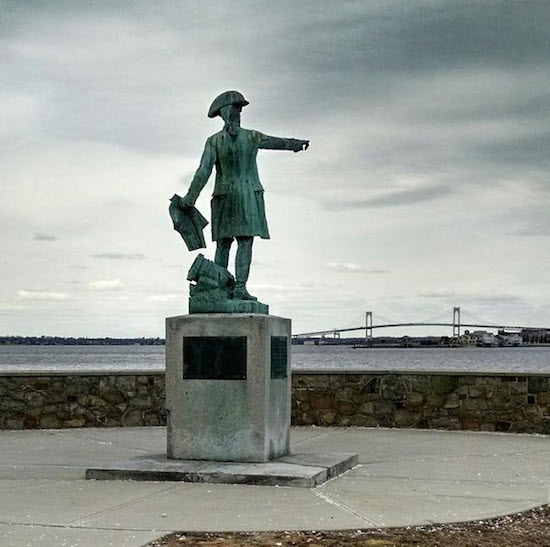Statue of Rochambeau in Newport.
When my father changed jobs, he and my mother moved hundreds of miles away. I was 15 and stayed behind, boarding at St. George’s School in Middletown, R.I., where I had been a day student.
I had a girlfriend a couple miles away, in Newport, whom I would visit on weekends. We would walk along the harbor at King Park, near where she lived with her mother. Close by the water’s edge we often lingered around the statue of Jean-Baptiste Donatien de Vimeur, Comte de Rochambeau, commander of the French forces so instrumental in helping the former colonists win the Revolutionary War.
“You are so lucky to have lived in Paris,” I told Molly. I had never been out of the U.S. before.
Molly had no immediate response, which was not unusual for her. In fact, it was something that I’d grown very much to like.
Molly had long dark hair, long legs, freckles and was partial to miniskirts. She had almond-shaped, hazel eyes that she outlined in mascara that gave her a deep and pensive look, but her sudden, toothy Irish smile could transform her whole face into bright sunshine.
Our time together always flew by. We wrote each other love letters and poems and sent them via U.S. Mail, so quaint by today’s standards.
“My parents split up when we came back here from Paris,” she said.
“I know,” I replied, and squeezed her hand.
On a Saturday in February, I went over to her house for dinner. Her mother, brother and sister were there. Vietnamese skirmishes and body counts were on the television news, as they were every night. I vowed that I would never go.
“Why, that would be unpatriotic,” said her mother. The year was 1967, and many adults in the United States still felt that way.
“But look at them getting shot at!” I said, gesturing to the TV. “Why would I want to get killed for nothing?”
“I would hardly call it for nothing,” said her brother.
“Really?” I asked. “Then could you please tell me why Americans are getting killed there?”
“Have you ever heard of communism?” said Molly’s sister.
“Yes. And do you think if a teeny, faraway country like Vietnam becomes communist it’s going to hurt us?”
“Could you please stop?” Molly asked me.
“What? Stop using my brain?”
“No. Start.”
“I beg your pardon?”
“When are you planning on getting a haircut?” asked her mother beneath her helmet of perfectly coiffed hair.
“No time soon,” I replied sullenly.
Easter was almost upon us but Molly mentioned nothing about it. I assumed that I’d be joining her family for dinner and brought it up.
“That won’t be happening,” she said.
“Why?”
“You’re persona non grata. My family doesn’t like you.”
“Because of last week?” I asked
“You were angry and upsetting.”
“I wasn’t angry. I was passionate! There is a difference!”
“And they saw us arguing.”
“We weren’t arguing. We had a few words. Doesn’t everyone do that from time to time?”
“Not in front of other people.”
“Am I to be crucified for it? How do you feel about not spending Easter together?” Molly lowered her eyes and shrugged.
“Sad.”
On Easter Sunday, I didn’t want to be seen alone around school, so I walked to half-town and bought a blueberry muffin and walked the rest of the way into Newport, winding up at the statue of the Comte de Rochambeau.
Unwrapping my muffin I saw something in the water. It was a white seal looking at me with dark, glossy eyes that were curious and compassionate. I started crying, missing my family and Molly.
The seal watched me and I heard in my head my mother’s voice: “Don’t be mad at Molly. She’s in an awkward position. It’s Easter, and I want you to be happy. Why not write a story about this? You’ll feel better.”
I grumbled and finished my muffin. Even at 15 I was a bit of a curmudgeon. Now, decades later, I’ve finally written the story and I do feel better. Somewhat. And I do still like a muffin, and thinking about Molly.
Charles Pinning is a Providence-based novelist who still procrastinates but plans on getting better.










